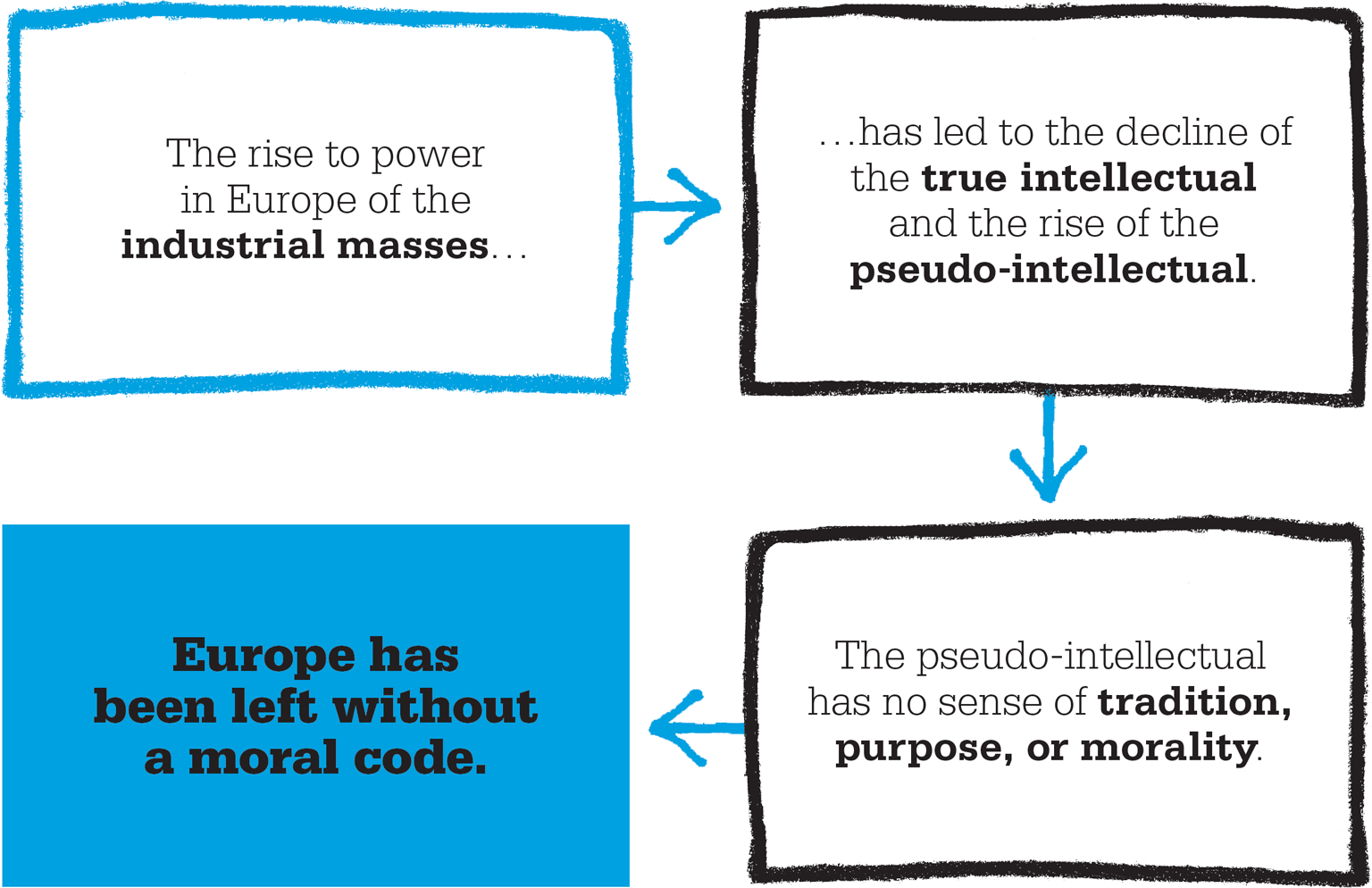
IN CONTEXT
Liberalism
Pro-intellectualism
380 BCE Plato advocates rule by philosopher kings.
1917 In Spain, news of the Russian Revolution instills fear in Primo de Rivera’s regime, which consolidates its power by control of the masses.
1936–1939 The Spanish Civil War results in the deaths of more than 200,000 people.
1979 French philosopher Pierre Bourdieu examines the ways that power and social positioning have an influence on aesthetics.
2002 US historian John Lukacs publishes At the End of an Age, arguing that the modern bourgeois age is coming to an end.
Philosopher José Ortega y Gasset first rose to prominence during the 1920s, a period of great social unrest in Spain. The monarchy was losing its authority following unrest in Spanish Morocco, and the dictatorial regime of Miguel Primo de Rivera had deepened divisions between left- and right-wing forces. These divisions would eventually lead to civil war in 1936.

World War I had been a period of economic boom in neutral Spain, which supplied both sides during the conflict. As a result, the country had rapidly industrialized, and the swelling masses of the workers were becoming increasingly powerful. Concessions were won, and a strike in Barcelona in 1919 led to Spain becoming the first country to institute an eight-hour day for all workers.
"The European stands alone, without any living ghosts by his side."
José Ortega y Gasset
Rise of the masses
As worker power increased, the question of social class was at the center of philosophical and sociological debate in Europe, but Ortega y Gasset challenged the idea that social classes are purely a result of an economic divide. Rather, he distinguished between “mass-man” and “noble-man” on the basis of their allegiance to moral codes based on tradition. In his book The Rise of the Masses, he explained that “to live as one likes is plebian; the noble man aspires to order and law.”. Discipline and service bring nobility, he believed. He saw the accession to power of the masses and their increased tendency towards rebellion—through strikes and other forms of social unrest—as highly problematic, calling it one of “the greatest crises that can afflict people, nations, and civilizations.”
To Ortega y Gasset, the threat posed by the masses was linked to a wider demoralization in postwar Europe, which had lost its sense of purpose in the world. The decline of imperial power, coupled with the devastation of the war, had left Europe no longer believing in itself, despite remaining a strong industrial force.
Pseudo-intellectuals
Ortega y Gasset argued that the rise of the masses is accompanied by the decline of the intellectual. This signals the triumph of the pseudo-intellectual—a vulgar man with no interest in traditions or moral codes, who sees himself as superior. The pseudo-intellectual represents a new force of history: one without a sense of direction.
For Ortega y Gasset, the masses lack purpose and imagination and limit themselves to demands for a share in the fruits of progress without understanding the classical scientific traditions that made progress possible in the first place. The masses are not interested in the principles of civilization or in the establishment of a real sense of public opinion. As such, he views the masses as highly prone to violence. In his eyes, a Europe without real intellectuals, dominated by disinterested masses, is somewhere that risks losing its place and purpose in the world.
Ortega y Gasset’s philosophy remains influential today. His followers stress the links between economic class and culture.

Following World War I, workers— such as these striking metal workers in France—won significant concessions and began to wield political power.
JOSÉ ORTEGA Y GASSET

Ortega y Gasset was born in Madrid to a political family with a deep liberal tradition. His mother’s family owned the newspaper El Imparcial, while his father edited it. He studied philosophy in Spain and continued his education in Germany at Leipzig, Nuremberg, Cologne, Berlin, and Marburg, where he became deeply influenced by the neo-Kantian tradition.
In 1910, Ortega y Gasset became full professor of metaphysics in Madrid. He later founded the magazine Revista de Occidente, which published work by some of the most important figures in philosophy at the time. Elected to Congress in 1931 after the fall of the monarchy and de Rivera’s dictatorship, he removed himself from politics after having served for less than a year. He left Spain at the outbreak of the Civil War and traveled to Buenos Aires, Argentina, only to return to Europe in 1942.
Key works
1930 The Revolt of the Masses
1937 Invertebrate Spain
1969 Some Lessons in Metaphysics
See also: Plato • Immanuel Kant • Friedrich Nietzsche • Michael Oakeshott
